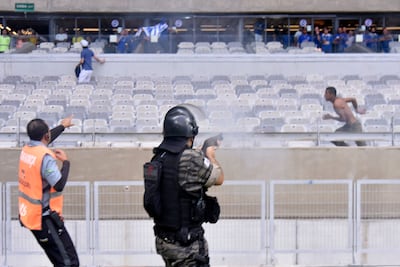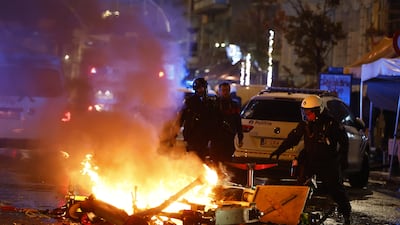I wanted England to win against France. This is, in part, because my partner is English and I called England home for many years. But mostly, I half-joked to my friends, I supported England for humanitarian reasons. It seems increasingly unlikely that Wednesday’s France-Morocco match-up, made inevitable by England’s loss, can take place without people getting hurt, some seeing their property destroyed and – it would be naive to pretend there is no chance of this happening – some maybe even losing their lives.
After France and Morocco’s victories on Saturday, “celebrating” supporters of both teams descended on to the Champs Elysee in Paris and smashed shop windows, setting fires on nearby Avenue de Friedland. Several dozen police officers were injured across the country, one with serious burns.
A minority of politicians, meanwhile, wasted no time inflaming these tensions. Gilbert Collard, a Member of European Parliament, wrote a Twitter post about a celebratory Moroccan flag having been raised atop a public building in the city of Amiens, accusing Moroccan immigrants of “taking possession” of France.
Morocco’s national team has been an inspiration for the Arab world, and France’s victory cements its already pre-eminent status in global football. But somehow these two positives cannot help but produce, for some extremely unfortunate bystanders, life-changing negatives.
As if there hadn’t been enough pressure on England captain Harry Kane’s ill-fated penalty kick already.
I have tried pretty well my entire adult life to get into football. I was born and raised in the US and Canada, so I had that extremely suburban childhood view of “soccer” as a wholesome after-school sport organised by “soccer moms”. When I moved to London at 17, it was time to get serious about the beautiful game or, at least, to try to take part in what was obviously an important part of the national culture.
But, football fans, you don’t make it easy. My first financial investment in fandom was the purchase of a Barcelona shirt, which I planned to wear to a central London pub to watch the club’s match with Chelsea, only to be stopped by a police officer in Covent Garden and advised to go home and change “for my own safety”.

Years later, while living in Istanbul I bought a Fenerbahce shirt in anticipation of attending their game against Galatasaray, a match-up famously known as the Intercontinental Derby. I couldn’t go in the end, but it might have been for the best, because after the match a pack of Galatasaray fans cornered a young Fenerbahce supporter and stabbed him to death.
In the intervening years, I’ve seen shouting matches turn into brawls and even full-scale riots over who kicked a plastic and latex ball better than someone else, and each time the distance between me and my hopes of cultivating a genuine love of football has grown wider.
This is, of course, a dramatic oversimplification, and probably a deeply irritating one to the most passionate football fans. I have had countless debates with football-loving friends, who breathlessly explain that football violence and hooliganism are outward symptoms of long-standing, even centuries-old social issues – classism, nativism, racism, social dispossession, inequality. It all gets very academic very quickly.
How and why football seems to have become the vessel for all of these social struggles apparently remains a mystery to most people. Researchers have written papers and books on football culture providing an avenue for “ritualised male violence”, but I have yet to see a compelling argument for why this phenomenon has not infected sporting culture in North America, where watching cable news for about five minutes will tell you that inequality and racism abound. You don’t often hear of a Texas Rangers fan being stabbed to death, or a mob of Toronto Raptors supporters clashing with the police.
That’s not to say it has never happened. After Vancouver’s loss to Boston in the 2011 Stanley Cup final, 140 Vancouver residents were injured in riots that saw cars set alight and more than $3 million worth of property damage. No one died. But people still talk about the Vancouver riots because they were so exceptional in the continent’s sporting history. And few words have been written about how the riots were an expression of economic inequality, which is a huge problem in Vancouver. North Americans are apparently unique in that, when they are upset about political things, they tend to protest those things directly rather than wait for a sporting event.
It is worth recognising the role of alcohol – its abundance is the main thing the Vancouver riots have in common with football riots elsewhere in the world. And for all the grumbling about Qatar’s decision to ban alcohol from stadiums during this World Cup, many of the fans interviewed throughout the tournament have actually said it has made for a more enjoyable, family-friendly experience. Maybe soccer moms are on to something.
But one relatively dry World Cup does not a cultural revolution make, and when the final whistle is blown in Qatar the rest of the football world will go back to the perennial challenge of cracking down on hooliganism, prying out racists and containing riots. Parisian police, braced for Wednesday’s France-Morocco match, will not even have the luxury of waiting that long.
After Canada’s elimination from the Qatar World Cup, the country’s English coach, John Herdman, tried to give some conciliatory words to children who were watching the matches at school assemblies back home, heartbroken that Canada’s first time on the World Cup stage in nearly four decades was so short-lived. “Those kids,” he said, “know we are a football country.”
But there is a certain sense of old-worldly, this-is-how-it’s-always-been, try-not-to-think-about-it mystery in football that North Americans will always have trouble connecting with. (Watch an American’s face when you tell them that calculating stoppage time is an inexact science.) I have to accept that this applies to football’s relationship with society, too. What puts the fire in a football fan’s belly is rooted in something ancient and inaccessible. And for those of us on the outside, I suspect that football fandom will be a closed shop for a long time to come.


